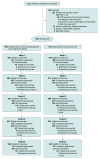Effect of Pharmacogenomic Testing for Drug-Gene Interactions on Medication Selection and Remission of Symptoms in Major Depressive Disorder: The PRIME Care Randomized Clinical Trial
- PMID: 35819423
- PMCID: PMC9277497
- DOI: 10.1001/jama.2022.9805
Effect of Pharmacogenomic Testing for Drug-Gene Interactions on Medication Selection and Remission of Symptoms in Major Depressive Disorder: The PRIME Care Randomized Clinical Trial
Abstract
Importance: Selecting effective antidepressants for the treatment of major depressive disorder (MDD) is an imprecise practice, with remission rates of about 30% at the initial treatment.
Objective: To determine whether pharmacogenomic testing affects antidepressant medication selection and whether such testing leads to better clinical outcomes.
Design, setting, and participants: A pragmatic, randomized clinical trial that compared treatment guided by pharmacogenomic testing vs usual care. Participants included 676 clinicians and 1944 patients. Participants were enrolled from 22 Department of Veterans Affairs medical centers from July 2017 through February 2021, with follow-up ending November 2021. Eligible patients were those with MDD who were initiating or switching treatment with a single antidepressant. Exclusion criteria included an active substance use disorder, mania, psychosis, or concurrent treatment with a specified list of medications.
Interventions: Results from a commercial pharmacogenomic test were given to clinicians in the pharmacogenomic-guided group (n = 966). The comparison group received usual care and access to pharmacogenomic results after 24 weeks (n = 978).
Main outcomes and measures: The co-primary outcomes were the proportion of prescriptions with a predicted drug-gene interaction written in the 30 days after randomization and remission of depressive symptoms as measured by the Patient Health Questionnaire-9 (PHQ-9) (remission was defined as PHQ-9 ≤ 5). Remission was analyzed as a repeated measure across 24 weeks by blinded raters.
Results: Among 1944 patients who were randomized (mean age, 48 years; 491 women [25%]), 1541 (79%) completed the 24-week assessment. The estimated risks for receiving an antidepressant with none, moderate, and substantial drug-gene interactions for the pharmacogenomic-guided group were 59.3%, 30.0%, and 10.7% compared with 25.7%, 54.6%, and 19.7% in the usual care group. The pharmacogenomic-guided group was more likely to receive a medication with a lower potential drug-gene interaction for no drug-gene vs moderate/substantial interaction (odds ratio [OR], 4.32 [95% CI, 3.47 to 5.39]; P < .001) and no/moderate vs substantial interaction (OR, 2.08 [95% CI, 1.52 to 2.84]; P = .005) (P < .001 for overall comparison). Remission rates over 24 weeks were higher among patients whose care was guided by pharmacogenomic testing than those in usual care (OR, 1.28 [95% CI, 1.05 to 1.57]; P = .02; risk difference, 2.8% [95% CI, 0.6% to 5.1%]) but were not significantly higher at week 24 when 130 patients in the pharmacogenomic-guided group and 126 patients in the usual care group were in remission (estimated risk difference, 1.5% [95% CI, -2.4% to 5.3%]; P = .45).
Conclusions and relevance: Among patients with MDD, provision of pharmacogenomic testing for drug-gene interactions reduced prescription of medications with predicted drug-gene interactions compared with usual care. Provision of test results had small nonpersistent effects on symptom remission.
Trial registration: ClinicalTrials.gov Identifier: NCT03170362.
Conflict of interest statement
Figures
Comment in
-
Pharmacogenomic Testing for Next-Step Antidepressant Selection: Still a Work in Progress.JAMA. 2022 Jul 12;328(2):146-148. doi: 10.1001/jama.2022.10018. JAMA. 2022. PMID: 35819435 No abstract available.
References
-
- Rothschild AJ, Parikh SV, Hain D, et al. . Clinical validation of combinatorial pharmacogenomic testing and single-gene guidelines in predicting psychotropic medication blood levels and clinical outcomes in patients with depression. Psychiatry Res. 2021;296:113649. doi:10.1016/j.psychres.2020.113649 - DOI - PubMed


